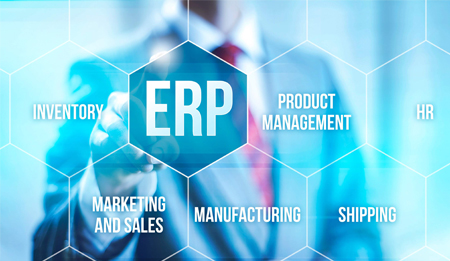ERP Solutions
Enterprise resource planning (ERP) is business processmanagement software that allows an organization to use a system of integrated applications to manage the business and automate many back office functions related to technology, services and human resources.
ERP software typically integrates all facets of an operation — including product planning, development, manufacturing, sales and marketing — in a single database, application and user interface.
ERP used to be accessible only to large enterprises because of the capital hardware required like servers and multiple workstations, and dedicated teams to handle its complex deployment, upgrades and maintenance. However, Forrester predicted that SaaS ERP deployment is accelerating as a mainstream delivery model with cloud vendors chipping away chunks of the market from legacy developers.

Today, SaaS technology enables vendors to offer lightweight ERP solutions to small businesses. Modules are sold separately or bundled as a plan, while hardware and technical maintenance are managed by vendors. The features of ERP software may be pared down or limited to a couple of functions. Still, small business can now reap the benefits of ERP software.
Companies typically utilize all facets of ERP or choose a combination of modules. Modules often address a main business area, such as, inventory management, accounting, payroll, human resources, marketing and product planning. The more robust ERP solutions feature CRM and business intelligence, but, expectedly, are pricier.
SARSE developing it's in house ERP, customize it based on business needs and deliver to customer.